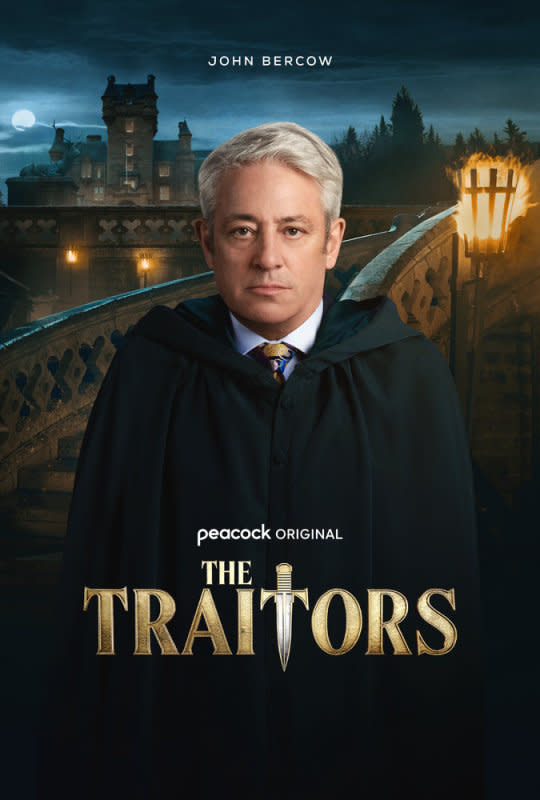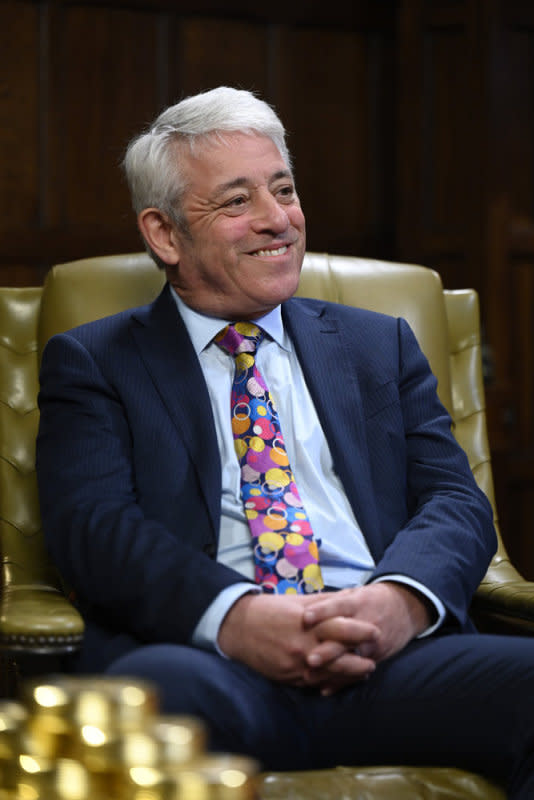Who Is 'The Traitors' Season 2's John Bercow?

- Oops!Something went wrong.Please try again later.
The Traitors is back for a second season and long gone are the flock of normies gallivanting around the castle with the reality TV all-stars. While Season 1's cast consisted of half known entities and half gen pop, Season 2 will be comprised of only celebrities. Among the 21 competitors, most are reality TV royalty with big names from Survivor, The Real Housewives, Dancing with the Stars and The Challenge all trying to bring home the $250,000 prize. However, there are a few outliers in the mix.
Related: Six Big Changes Coming to 'The Traitors' for Season 2
One of the most fascinating pieces of casting is a name that many American viewers are unlikely to know: John Bercow. If you're unfamiliar, that's because he's a British politician, a longtime Member of Parliament and the Speaker of the House of Commons. Bercow is arriving to The Traitors with no reality TV experience and because of that, it seems highly unlikely that most of the Traitors cast will know who he is. That being said, he's coming off of a series of very British scandals, so here's everything you need to know about the politician before you start your binge:

Peacock
Who is John Bercow?
Member of Parliament
Bercow was originally elected to the House of Commons in 1997, becoming a Member of Parliament (or MP) on behalf of the Conservative Party. As best I can tell based on my limited knowledge of the UK's political systems, this is somewhat equivalent to being elected to the House of Representatives as a Republican in the US (although the Brits have more parties and only elect members to one of their two chambers of government). Once elected he became a fairly popular MP, being reelected multiple times and rising the ranks until 2009, when he was promoted to the Speaker of the House of Commons.
Speaker of the House of Commons
Basically, in 2009, Bercow became the Nancy Pelosi of Parliament, only in the House of Commons, the Speaker has to give up their party affiliation and stand as a fairly impartial leader. Bercow had been seen as someone who flirted the line between the Conservative and Labour parties during his career, so he seemed like a good pick and was elected by a coalition of both parties. He was repeatedly re-elected and served four terms until he resigned in 2019 amid the Brexit turmoil.
Retirement and party swap
Upon retirement, the Speaker of the House of Commons is traditionally granted "peerage," which means you're given an honorary title and promoted to the House of Lords. However, in a fairly unprecedented move, Bercow was denied this privilege by the Prime Minister Boris Johnson because he was seen as being biased in his handling of the Brexit conflict.
Despite originally being elected under the Conservative Party, Bercow has been increasingly outspoken regarding his disdain for the current party leadership and ultimately opted to join the Labour Party after he left the Speakership. He's had particularly negative things to say about Johnson and has spoken out against Brexit repeatedly.
Bullying controversy
In 2018, before Bercow had left office, he was accused by several former staffers of bullying and harassment. These allegations were eventually investigated in 2022 by the Independent Expert Panel and the Parliamentary Commissioner for Standards that concluded Bercow had been a "serial bully" among other things. As a result, he was barred from ever serving in Parliament again, although he denied the allegations and called the affair a "kangaroo court."
Related: Meet the Full Cast of 'The Traitors' Season 2

Peacock
Joining The Traitors
Prior to filming The Traitors, Bercow sat down with Parade to discuss why he'd decided to participate on the show and what his strategy was coming into the game.
Matthew Huff: What was your reason for coming on the show in the first place?
John Bercow: There were really two reasons why I wanted to do it. First, I thought at the age of 60, it's time I departed from my comfort zone. I like to think I'm morally brave, but I'm not particularly physically brave, I'm not exactly your intrepid James Bond figure, to put it mildly.
The second reason was that I rather fancied the idea of being able to be a Faithful in pursuit of Traitors. I'm sufficiently self-aware to know that if people have any view about politicians, they tend to think they're dishonest, untrustworthy, smoothies, liars, backstabbers, etc. And so that's the stereotype, and I thought, well, I don't know whether I'm going to be any good at this, but I'm very keen to play the role of a Faithful and to uncover, to expose the traitors. I'd quite like to flout the stereotype.
Are you prepared for the emotional highs and lows of this game?
I suppose it's really a question of whether you master your emotions or allow your emotions to master you. I hope to do the former not the latter, but I think it's not a question of fait a complete or absolute knowledge that you're going to be able to adhere to your plan. It's a work in progress. It's trial and error, and you take it as it comes. You try to distinguish between what is huge and what is not huge or even infinitesimally small as a concern.
In terms of overall pressure, I suppose there are two slightly competing phenomena for me. On the one hand, it is completely new because I've never done this sort of thing before, and in I'm amongst a predominant American cast, so that's fun, but new and different. So there's that element of the unknown.
The one element of the known, albeit from a different environment, is that, having spent 25 years in public life, just over 20 years in the British Parliament and just over a decade as Speaker, I did experience some high-octane moments, some pressure, some experiences of Prime Ministers trying to push me around and me telling them, "You're not going to do that. It's not going to happen. I'm going to do my job." So am I, to be blunt, bricking it? No, I may be bricking it about a physical challenge, but bricking it about a conflict? No.
How did your family react to you deciding to come on the show?
I must admit I wasn't as instinctive. I did think about it. I made a point of watching the previous American series, the Australian series and the British series, and I decided I'd like to do it. There was a caveat. My family were all keen on me doing it, subject to the caveat suggested by my wife, who said to me, "You're not physically very brave and if you're going to be anxious about some of the more physical challenges you should go to Thorpe Park." So I went to Thorpe Park with my 15-year-old daughter, and I went on four of the scariest rides and my wife said, "I think now that you've done that, you're bloodied and you're probably all right."
The format and the nature of the show is attractive. There are things that are difficult but not ludicrously undignified. For what it's worth, as television I think the missions are the least compelling viewing, which doesn't mean they're not worth watching and enjoyable. I think personally I find attractive the intensity of the Round Table, more interesting. Having to say what you think, to look people in the eye and to deal with what Kipling called "the slings and arrows of outrageous fortune."
Next, Everything You Need to Know About 'The Traitors' Season 2

